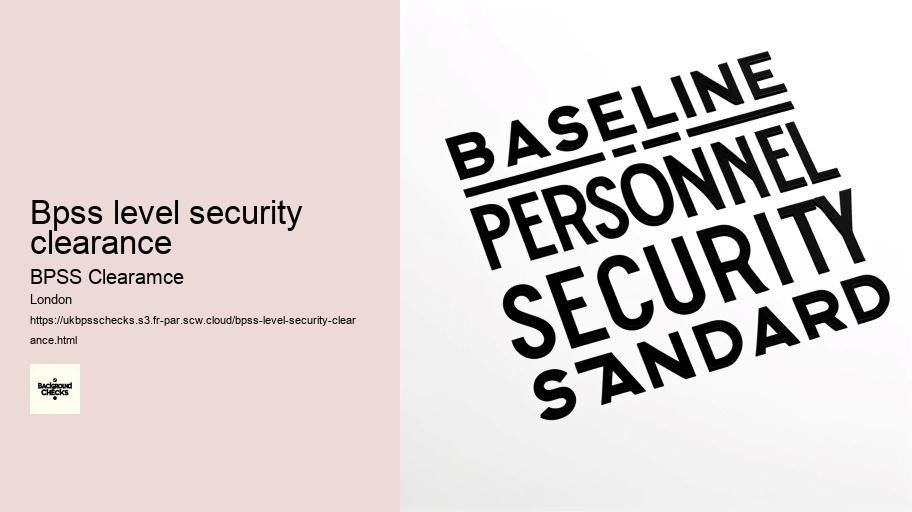
The integration of digital technologies has streamlined the BPSS clearance process, making it more efficient and less prone to errors. Digital solutions allow for the rapid processing of checks and secure storage of sensitive data, enhancing the overall security and efficiency of the vetting process.
Generally, a BPSS check can take anywhere from two weeks to a month to complete. This timeframe assumes that there are no complications, such as discrepancies in the information provided or delays in receiving necessary documents from third parties.
Several factors can influence the duration of a BPSS check. These include the accuracy of the information provided by the applicant, the speed with which previous employers respond to verification requests, and the specific requirements of the employing organization.
Transportation officials, especially those involved in overseeing or managing public transport security, require BPSS clearance due to the potential risks associated with transportation infrastructure and mass transit systems.
Ensuring your legal right to work in the UK is documented is an essential step in the BPSS clearance process. To successfully verify your national and immigration status, you must provide specific documentation.
While DBS checks are significant for specific sectors like healthcare and education, BPSS is tailored for individuals with access to government assets and secret information.

To verify your employment history for BPSS clearance, make sure you have documentation such as PAYE records, HMRC tax records, payslips, P45, and P60. These documents are essential in demonstrating your work experience and financial records.
The process of obtaining BPSS clearance includes a detailed review of the applicant's identity documents, such as passports or driver's licenses. This step is vital to confirm that the individual is who they claim to be, which is fundamental in preventing identity fraud within high-security environments. Proper identification is the cornerstone of the BPSS clearance process and helps maintain the integrity of the workforce within protected sectors.
However, for positions where exposure to SECRET and TOP SECRET information is probable, BPSS stands out as a fundamental baseline standard ensuring the trustworthiness and eligibility of individuals in sensitive roles.
The importance of BPSS clearance lies in its role in verifying essential aspects of individuals' backgrounds for positions involving sensitive information access. This clearance process confirms key details such as identity, work rights, trustworthiness, honesty, and integrity, ensuring that only qualified and reliable individuals are granted access to sensitive data.
Your legal right to work in the UK is an essential aspect of BPSS clearance. One key consideration in this process is the disclosure of any unspent criminal records. Unspent criminal records refer to offenses that haven't yet been spent under the Rehabilitation of Offenders Act 1974. These records play an important role in the BPSS clearance process as they're thoroughly evaluated during background checks.
Transparency in the BPSS clearance process is crucial for maintaining the trust of potential employees. Organizations should be clear about what the BPSS check entails and how the information gathered will be used, ensuring that applicants understand the importance and implications of the clearance process.


To grasp the significance of BPSS screening, consider its role in verifying essential personal and professional details for individuals in sensitive positions with access to government assets. BPSS checks validate that individuals are trustworthy and suitable for roles with potential exposure to SECRET and TOP SECRET information, even though BPSS itself isn't a formal security clearance.
While BPSS itself is not mandated by specific laws, it operates under the broader legal and regulatory framework that governs national security and employment practices in the UK. BPSS clearance procedures are based on standards set by the UK Government, particularly by the Cabinet Office, which outlines the national security vetting policies.
Individuals applying for National Security Vetting (NSV) must undergo a BPSS check as a prerequisite.
BPSS clearance procedures also adhere to UK employment laws to ensure that the vetting process is non-discriminatory and respects the rights of individuals. Employers must ensure that their BPSS processes comply with the Equality Act 2010, avoiding any form of discrimination based on protected characteristics during the vetting process.
BPSS checks involve several key components: identity verification, employment history check, criminal record check, and nationality and immigration status check. Each of these areas is carefully examined to ensure that the individual does not pose a security risk.
Reviewing a candidate’s employment history is another vital component of the BPSS checks. This involves verifying previous employment details, gaps in employment, and reasons for leaving previous positions. The aim is to confirm the candidate's work history and to identify any inconsistencies that might suggest security risks.

Providing evidence of at least three years of employment history is an important requirement for BPSS clearance. HMRC tax records and National Insurance contributions can be used to validate your employment history.
To secure BPSS clearance, it's imperative to provide the necessary documents such as proof of identity, employment history, national and immigration status, details on criminal records, and periods spent abroad. Adhering to these requirements is crucial for successfully obtaining BPSS clearance and gaining access to UK OFFICIAL and SECRET assets. Be sure to thoroughly verify all documents for accuracy and completeness before submitting your application.
Digital technology enables greater scalability in conducting BPSS checks. As organizations grow and need to process larger volumes of security clearances, digital systems can be scaled to accommodate increased demand without a proportional increase in resources or degradation in the speed of processing.
BPSS stands for "Baseline Personnel Security Standard." It's essentially a basic level of security clearance required for individuals working in roles that involve access to sensitive information or facilities, especially in the public sector. The BPSS checks typically include identity verification, employment history checks, and criminal record checks.
No, BPSS (Baseline Personnel Security Standard) and DBS (Disclosure and Barring Service) are not the same.
BPSS (Baseline Personnel Security Standard): This is a set of government guidelines in the United Kingdom for ensuring the security clearance of individuals working with sensitive information or in certain roles. It is a basic level of security clearance and involves checks such as identity verification, employment history, and criminal record checks. BPSS is often required for roles in both the public and private sectors where access to sensitive information or facilities is involved.
DBS (Disclosure and Barring Service): This is a government agency in the UK that performs checks on individuals working with children or vulnerable adults. The DBS conducts criminal record checks (previously known as CRB checks) to help organizations make safer recruitment decisions by identifying candidates who may be unsuitable for certain roles due to past criminal convictions, cautions, reprimands, or warnings.
While both BPSS and DBS involve background checks, they serve different purposes and are used in different contexts. BPSS focuses on security clearance for a broader range of roles, including those involving access to sensitive information, while DBS specifically focuses on roles involving work with vulnerable groups.
The Baseline Personnel Security Standard (BPSS) checks typically include:
Identity Verification: Verifying the identity of the individual through official documents such as passports, driver's licenses, or other government-issued identification.
Employment History Checks: Verifying the individual's employment history to ensure accuracy and assess their suitability for the role.
Criminal Record Checks: Checking for any criminal convictions or cautions. This is often done through a Basic Disclosure from the Disclosure and Barring Service (DBS) in England and Wales, Disclosure Scotland in Scotland, or AccessNI in Northern Ireland.
Verification of Address: Verifying the individual's current and previous addresses to ensure accuracy and completeness of their background information.
These checks are aimed at establishing a baseline level of trustworthiness and suitability for individuals working in roles that require access to sensitive information or facilities, particularly within the public sector but also in some private sector positions.
A valid proof of address for a Baseline Personnel Security Standard (BPSS) check typically includes official documents that clearly display the individual's name and current address. Common examples of acceptable proof of address documents may include:
Utility Bills: Recent bills for services such as electricity, gas, water, or landline phone, issued within the last three to six months.
Bank Statements: Recent bank statements, typically issued within the last three to six months, showing the individual's name and address.
Official Letters: Letters from government agencies, local authorities, or financial institutions, such as tax statements, council tax bills, or letters from the Department for Work and Pensions (DWP), which display the individual's name and address.
Tenancy Agreements: A signed and dated rental or lease agreement for accommodation, showing both the tenant's and landlord's details, along with the property address.
Mortgage Statements: Statements from a mortgage provider showing the individual's name and property address, issued within the last three to six months.
It's important to note that the specific requirements for proof of address may vary depending on the organization conducting the BPSS check. Additionally, the document should be recent and not expired, and it should clearly display both the individual's name and current address.
A Baseline Personnel Security Standard (BPSS) check is typically required for individuals working in roles that involve access to sensitive information or facilities, particularly within the public sector but also in some private sector positions. While specific requirements may vary depending on the organization and the nature of the role, BPSS checks are commonly needed for individuals who:
In summary, individuals who require a BPSS check are those whose roles involve a level of trust, responsibility, and access to information or facilities that necessitate verification of their identity, employment history, and suitability for the position.
The Baseline Personnel Security Standard (BPSS) does not have an expiry date like some other security clearances. Instead, it serves as a foundational level of security clearance that establishes an individual's baseline trustworthiness and suitability for roles requiring access to sensitive information or facilities.
However, while the BPSS itself does not expire, organizations may have their own policies regarding the periodic review or renewal of security clearances for their employees. For instance, some employers may require employees to undergo regular rechecks or refreshes of their background checks, including BPSS checks, to ensure that their security clearance remains up to date.
Therefore, although the BPSS clearance itself doesn't have a fixed duration, individuals and organizations should be aware of any policies or requirements related to maintaining and updating security clearances in accordance with best practices and organizational guidelines.